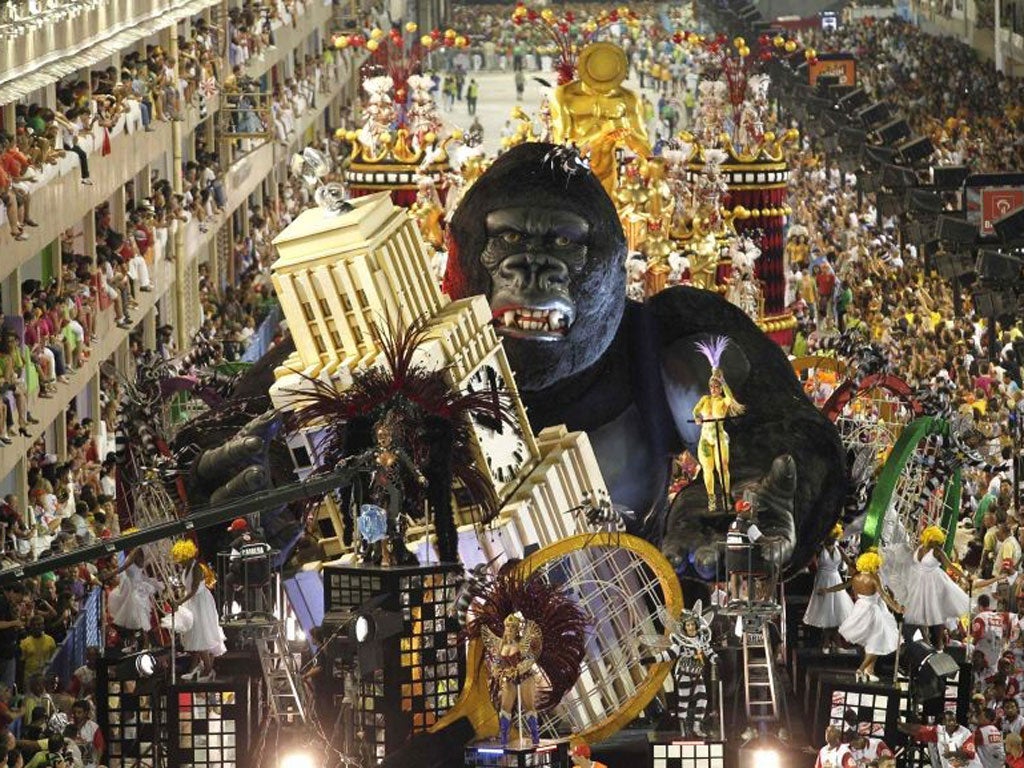Police strike brings chaos to Brazil
Officers tell tourists to stay away from famous carnival as walkout turns violent

Your support helps us to tell the story
From reproductive rights to climate change to Big Tech, The Independent is on the ground when the story is developing. Whether it's investigating the financials of Elon Musk's pro-Trump PAC or producing our latest documentary, 'The A Word', which shines a light on the American women fighting for reproductive rights, we know how important it is to parse out the facts from the messaging.
At such a critical moment in US history, we need reporters on the ground. Your donation allows us to keep sending journalists to speak to both sides of the story.
The Independent is trusted by Americans across the entire political spectrum. And unlike many other quality news outlets, we choose not to lock Americans out of our reporting and analysis with paywalls. We believe quality journalism should be available to everyone, paid for by those who can afford it.
Your support makes all the difference.Brazil's armed forces are on standby to take over in Rio de Janeiro after police went on strike just days before the start of the city's famous carnival.
The stand-off over salaries and working conditions follows 11 days of violent clashes in Salvador, the capital of the north-eastern state of Bahia, between striking officers and federal authorities brought in to restore order.
Protesting police and firefighters cried: "Carnival is over! Carnival is over!" in Salvador and the US warned tourists to stay away. It is feared the unrest could spread across the country now that Rio's force has also walked out.
About 2,000 police and firefighters gathered noisily but peacefully in Rio's city centre yesterday and voted to strike. Many military police in Rio are working long hours in dangerous conditions to rid the city's shanty towns, or favelas, of armed drug gangs long hours in dangerous conditions.
Officially, the carnival starts on 16 February, though many street parties have already begun. The expected arrival of millions of tourists would pose a public security challenge even with a fully operational police force.
In Salvador, a police salary starts at 1,900 Brazilian reals (£700) a month, but in Rio wages can be as little as 1,030 reals, despite a high cost of living. The city council has voted to increase police salaries by up to 39 per cent, but the rise will not take effect until next year and officers want it sooner.
President Dilma Rouseff condemned acts of vandalism by some police in Salvador, as it emerged that 11 arrest warrants had been issued for those suspected of starting the new wave of walkouts in Rio. A wiretap authorised by the courts appeared to show a Salvador firefighter and a left-wing Rio congresswoman discussing the need to keep the strike going in Bahia, so as to incite similar protests in other cities, including Rio de Janeiro and potentially São Paulo. When the firefighter arrived in Rio on Wednesday he was jailed under a military law, as judges are disputing whether strikes by police forces or firefighters are legal.
"If police and firefighters are not allowed by law to strike, it makes it difficult for them to get improvements to their pay and conditions," said Paulo Storani, a former special forces co-ordinator and public security expert. "The salary is so low in Rio that many police take second jobs, often better paid. They don't get a chance to rest, and the resulting physical and emotional stress can erupt into violence."
Those in Salvador describe a climate of fear, with hundreds of cars robbed, buses set on fire, shops destroyed and people afraid to leave their homes.
The number of murders has also doubled compared with the same period last year. Police have been blamed for many acts of violence, to demonstrate to the authorities that the city will grind to a halt without effective policing.
João Faria, an engineer, was in Salvador when suspected striking police officers stopped the bus he was on. "About four men with their faces covered with T-shirts, waving guns, stopped the bus. They ordered it to be moved to the middle of the street, stopping all the traffic. When I saw the gun, I thought I was going to get shot. People were very frightened," he said. "It took me three hours to get away."
Mr Storani warned: "What has happened in Salvador could happen in Rio if the police stop working. Responsible police will still go to work because they don't want to break the law. But until the Brazilian people demand change, the protests will continue and the public will not get the protection it deserves."
Join our commenting forum
Join thought-provoking conversations, follow other Independent readers and see their replies
Comments